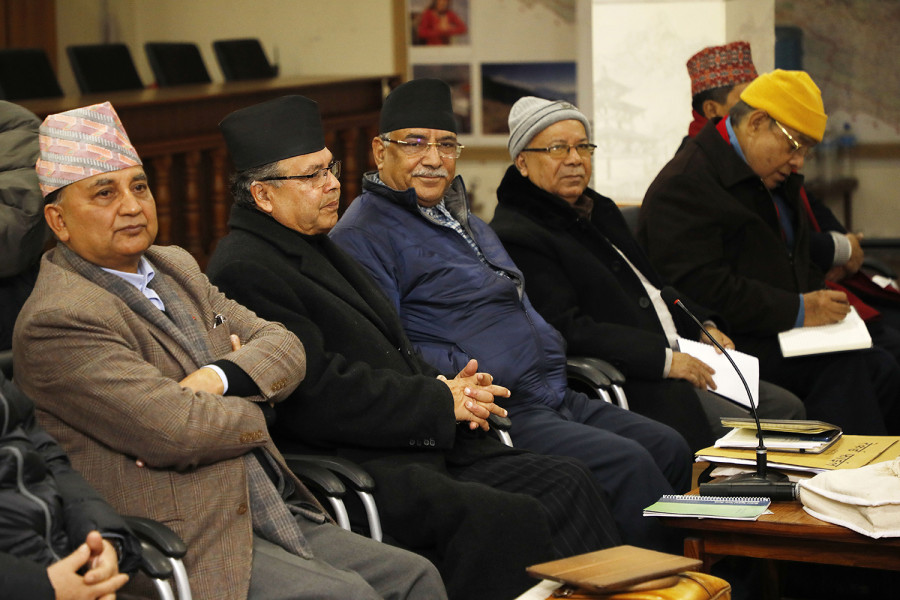Politics
Conflict is brewing between ruling party and provincial and local governments, say leaders
Heads of government do not seem to want to consult with the Nepal Communist Party’s provincial committees, despite a directive from the central committee.
Tika R Pradhan
Taking the criticism into account, the meeting had directed the government to carry out its duties in close consultation with the party. Party members, however, say the directive was unnecessary, as it is understood in the Nepali political system that a party voted to power works in line with its policies as well as the promises made in its election manifesto.
But that was not happening, given Oli's style of governance, say party members.
According to one party leader, members are often reluctant to defend the government’s actions because decisions are being made without consulting the party committees—the Central Committee, Secretariat and Standing Committee. The Nepal Communist Party (NCP) has yet to form the politburo, a crucial committee in a communist party.
Leaders say the party-government conflict that was becoming visible in Kathmandu now is slowly appearing at the provincial level.
“It’s not only the federal government. Provincial governments are also operating arbitrarily without consulting the party,” said Yubaraj Chaulagain, a central committee member. “The problem in local governments is more alarming where our party committees have yet to make their presence felt.”
On Wednesday, Chief Minister of Bagmati Province Dor Mani Poudel appointed provincial chief whip of the ruling Nepal Communist Party Rameswor Phuyal as the province’s Minister for Physical Infrastructure and Development.
But Phuyal has yet to take the oath of office as his appointment has been held up by the party.
“The chief minister took the decision to appoint Phuyal with the approval of the prime minister but the provincial committee refused to accept it,” Yubaraj Dulal, the province’s minister for social development, told the Post.
Phuyal confirmed that he had yet to take his oath of office but refused to elaborate further.
According to party leaders, Phuyal’s appointment was halted by the party’s provincial committee. Asta Laxmi Shakya, chief of the party’s Bagmati provincial committee, said she had rejected Poudel’s proposal to appoint Phuyal because the decision had not been made in consultation with the party.
“It was a unanimous decision of the party’s provincial committee to reject Phuyal’s appointment,” said Shakya.
According to Shakya, the provincial committee had urged Poudel to take the decision only after a thorough assessment of the government’s performance.
“We [the party] have been facing severe criticism from the public that the Cabinet of Bagmati province is not inclusive as it has no representation of women,” said Shakya. “But the chief minister appointed a leader of his choice, which was not acceptable to the party. Chief Minister Poudel should be accountable for any consequences if he decides to continue with the appointment despite the party's refusal.”
The provincial ministry has remained vacant ever since Poudel sacked Keshav Sthapit in November 2018 following a verbal exchange.
Tensions between the governments and the larger party have long been a feature of the Oli administration. Oli himself doesn’t consult the party’s committees; instead, he relies on a small circle of advisors and party loyalists. When he takes decisions, he tends to do it unilaterally. The style of governance has permeated to the provincial and local levels, say leaders.
The ruling Nepal Communist Party leads the federal government and six of the seven provinces with a majority. It also runs most of the 753 local governments. But most of these governments have been criticised for failing to deliver on their promises, and the party committees are reluctant to defend the governments because they feel like they don’t have a stake, say party insiders.
Party leaders say that a conflict between the party and the various governments is in the works as respective party committees will now begin to demand a say in the functioning of the governments.
“The relationship between the party and the governments could worsen,” said Lekhnath Neupane, another central committee member. “Relations at the provinces, other than Gandaki and Province 5 where the chief ministers are in charge of the party’s provincial committees, are already bad. The heads of government do not consult the local party chiefs as they say they were elected by the people.”




 10.12°C Kathmandu
10.12°C Kathmandu















